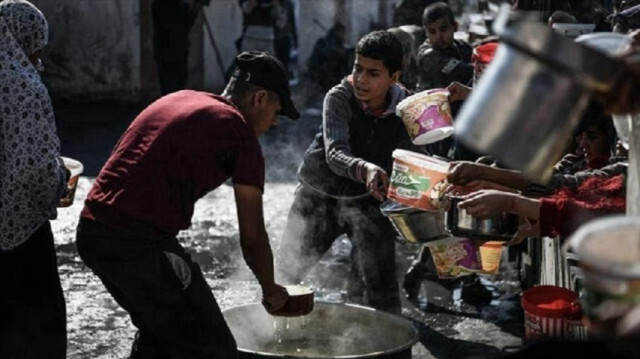
World ‘cannot hide the fact that it is difficult to get in the emergency aid.' says Development Cooperation and Global Climate Policy Minister Dan Jorgensen
The Danish Foreign Ministry announced that it is sending $15 million in humanitarian assistance to the Gaza Strip and West Bank amid warnings of imminent famine, media reports said Tuesday.
The ministry emphasized, however, that the world “cannot hide the fact that it is difficult to get in the emergency aid.”
“Therefore, at the same time, we are putting massive diplomatic pressure on Israel to open up better opportunities to bring in the emergency aid,” Minister for Development Cooperation and Global Climate Policy, Dan Jorgensen, said in a statement.
As the situation is getting worse daily, Denmark is trying to help “an absolutely terrible situation,” where there is a need “for absolutely basic life necessities,” Jorgensen added.
The money will contribute to clean drinking water, food and while a portion will be used to protect the aid workers in Gaza ensuring also that the aid can reach the civilian population, according to Denmark Broadcasting Corporation, or DR.
Seven aid workers from the international aid organization, World Central Kitchen (WCK), were killed in a convoy earlier this month in an Israeli airstrike.
Israel called it "a mistake," but WCK said it believed it was not an accident and that the strike was systematically aimed at the convoy.
Around 30% of the Danish contribution will go to the UN Food Program (WFP), according to DR.
The WFP is the UN's food program and the world's largest humanitarian organization, which focuses on fighting hunger.
Since Oct. 7, trucks carrying emergency aid to Gaza have piled up in Egypt near the southern Gaza border crossing in the town of Rafah.
In March, WFP provided emergency aid to “more than a million people” in Gaza, it said.
“It is particularly in southern and central Gaza that we have relatively good access. The big problem is gaining access to northern Gaza,” Andreas Hansen, director of WFP's Nordic office was quoted by DR.
To feed more than 1 million people each month in Gaza, the WFP needs the equivalent of more than $800 million for the rest of the year, according to Hansen.
Danish aid organizations, including Oxfam Denmark, urged Israel earlier this month to keep border crossings to Gaza open permanently after Tel Aviv agreed to temporarily reopen the Erez Gate in northern Gaza for the first time since Oct. 7 and the Ashdod Port for humanitarian deliveries due to US pressure.
“We need permanent access for food, water, and medicine. It is Israel's obligation as the occupying power to ensure that there is food and water for the population, otherwise, it is a breach of international law,” said Oxfam Denmark Secretary General Lars Koch.
Koch stressed that civilians and aid workers must be guaranteed safety.
“It is absolutely crucial that a ceasefire and security are also established, so that we can deliver the emergency aid without us or civilians being killed,” he said.
A similar announcement came from Bjarke Skaanning, disaster manager at the Red Cross.
“It is clear that by far the biggest challenge will be to ensure the distribution of emergency aid inside Gaza, and that the civilian population actually gets access to it,” said Skaanning.
It is also extremely important that “we, as emergency aid organizations, can carry out emergency aid distributions safely, and that Israel thereby also lives up to the obligation it has in relation to the rules of war -- namely that the civilian population must have access to very basic necessities,” he added.

